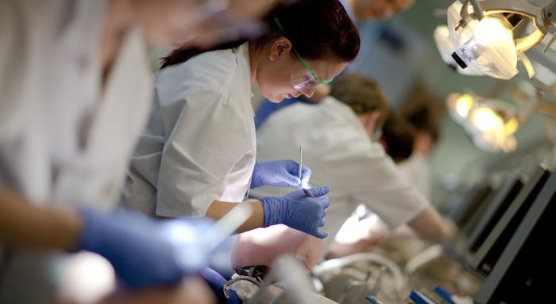£1.9million to help children from deprived areas brush up on oral health
Published On Wed 1 Mar 2017 by £1.9million to help children brush up on oral health

A new research project led by the Universities of Dundee and Sheffield has been awarded almost £2million to investigate ways of improving the oral health of young people living in deprived areas.
The researchers will work with 48 schools and nearly 6000 young people in Scotland, England and Wales on the four-year Brushing Reminder 4 Good Oral Health (BRIGHT) initiative.
BRIGHT, funded by the National Institute for Health Research (NIHR), will investigate whether a classroom-based lesson about dental health followed by a series of text messages could increase how often and how well children aged 11-16 brush their teeth – and ultimately reduce levels of tooth decay.
In each school, one class will receive the talk and a series of text messages, while another will not. The team will collect information on tooth decay, frequency of brushing, and the impact decay has on the children’s lives to determine whether those in the programme develop better oral health habits than those who don’t participate.
Professor Nicola Innes, from Dundee’s School of Dentistry, said, “Dental decay is preventable and, in some ways, that should be simple. Just brush with a toothbrush and fluoride toothpaste. However, enacting that prevention at the level of the individual person isn’t always so simple.
“We are looking forward to taking up the challenge in this often overlooked group – young people living in deprived areas – who suffer a disproportionate amount of dental disease, toothache, and subsequent loss of sleep and time at school.”
The classroom-based teaching session has been created by Dundee’s School of Education and Social Work, while the text messages will be delivered via TextApp, a software tool devised by the School of Medicine’s Health Informatics Centre.
The Dundee and Sheffield researchers will work with colleagues from the Universities of Leeds and Cardiff and the York Trials Unit on the project.
Dr Zoe Marshman, Reader in Dental Public Health at the University of Sheffield, said, “We welcome the opportunity to help children in secondary schools in deprived areas achieve good dental health which can then be maintained throughout their lives.”
“To do this we are working with children, parents and school staff together with an expert team of researchers in dentistry, health economics, psychology, education, digital technology and trials.
Notes to editors:
The National Institute for Health Research (NIHR) is funded by the Department of Health to improve the health and wealth of the nation through research. The NIHR is the research arm of the NHS. Since its establishment in April 2006, the NIHR has transformed research in the NHS. It has increased the volume of applied health research for the benefit of patients and the public, driven faster translation of basic science discoveries into tangible benefits for patients and the economy, and developed and supported the people who conduct and contribute to applied health research. The NIHR plays a key role in the Government’s strategy for economic growth, attracting investment by the life-sciences industries through its world-class infrastructure for health research. Together, the NIHR people, programmes, centres of excellence and systems represent the most integrated health research system in the world. For further information, visit the NIHR website (www.nihr.ac.uk).
For media enquiries contact:
Grant Hill
Press Officer
University of Dundee
Nethergate, Dundee, DD1 4HN
Tel: +44 (0)1382 384768
Mobile: 07854 953277
Email: g.hill@dundee.ac.uk